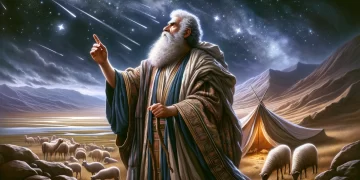Views: 1
Date of Events & Date of Writing & Primary Audience
- Date of Events: The events of Genesis 15:1-21, describing Abraham’s Covenant with God, are traditionally placed around 2000-1900 BC.
- Date of Writing: The Book of Genesis is traditionally attributed to Moses and is believed to have been written around 1446-1406 BC during the Israelites’ exodus from Egypt.
- Primary Audience: The primary audience was the Israelites, providing them with an understanding of their covenant relationship with God and the divine promises to their patriarch, Abraham.
Story Summary
- Summary: Genesis 15:1-21 recounts God’s covenant with Abram, where God promises him numerous descendants and the land of Canaan. God confirms this covenant through a vision and a ritual involving the sacrifice of animals.
Story Background
- Background: This narrative occurs after Abram’s victory over the kings and his encounter with Melchizedek. It builds on the earlier promises made to Abram, emphasizing the formalization of the covenant relationship between God and Abram.
Story Highlights
- Highlights:
- God’s Assurance: God reassures Abram of His protection and reward (“Do not be afraid, Abram. I am your shield, your very great reward”).
- Promise of Descendants: God promises Abram numerous descendants like the stars (“Look up at the sky and count the stars—if indeed you can count them… So shall your offspring be”).
- Covenant Ceremony: God instructs Abram to prepare a sacrificial offering, and a smoking firepot and a blazing torch pass between the pieces (“On that day the LORD made a covenant with Abram and said, ‘To your descendants I give this land'”).
Story Purpose
- Purpose: To formalize God’s covenant with Abram, ensuring the promise of descendants and land, and to illustrate Abram’s faith in God’s promises.
Story Theme
- Theme: The themes include faith, covenant, divine promise, and inheritance.
Jesus Connection
- Jesus Connection: The covenant with Abram prefigures the New Covenant in Christ, where Jesus fulfills the promises to Abraham’s descendants and extends the blessing to all nations (Galatians 3:16).
Kingdom Connection
- Kingdom Connection: The covenant signifies the establishment of God’s people and the Kingdom on earth, through which all nations will be blessed and the promise of God’s Kingdom will be fulfilled.
Archaeology or Scientific Discovery
- Archaeology/Scientific Discovery: While direct evidence of Abram’s life is not available, archaeological findings related to ancient covenant practices provide context for understanding the significance of the rituals described in Genesis 15.
Hebrew Meanings of the Keywords
- Keywords:
- “Berit” (בְּרִית) – “Covenant,” indicating a binding agreement between God and Abram.
- “Emunah” (אֱמוּנָה) – “Faith” or “belief,” referring to Abram’s trust in God’s promises.
- “Zera” (זֶרַע) – “Seed” or “offspring,” denoting the promised descendants of Abram.
- “Yare” (יָרֵא) – “Fear,” used in the context of God’s reassurance to Abram (“Do not be afraid”).
- “Shalem” (שָׁלֵם) – “Whole” or “complete,” related to the idea of a complete offering in the covenant ceremony.
Kingdom Teaching(s)
- Kingdom Teaching(s):
- Faith and Righteousness: Abram’s belief in God’s promises, counted as righteousness, exemplifies the Kingdom principle of faith being foundational to righteousness.
- Covenant Relationship: The formalization of God’s covenant with Abram highlights the importance of covenant relationships in the Kingdom, where God commits to His people and they commit to Him.
- Divine Promise and Inheritance: The promise of land and descendants underscores the Kingdom themes of inheritance and the fulfillment of divine promises, showing how God’s plans unfold through history.
By examining the story of Abraham’s Covenant with God through these various lenses, we gain a comprehensive understanding of the foundational elements of faith, covenant, and divine promise that are integral to the unfolding of God’s Kingdom.
![Abraham’s Covenant with God [Genesis 15:1-21]](https://kingj.tv/wp-content/uploads/2024/04/Abrahams-Covenant-with-God-from-Genesis-15_1-21-1140x570.webp)


![Creation of the World [Genesis 1:1-2:3]](https://kingj.tv/wp-content/uploads/2024/05/DALL·E-2024-06-01-23.50.14-A-vibrant-and-majestic-landscape-format-image-depicting-the-Genesis-story-of-the-Creation-of-the-World-360x180.webp)
![Isaac’s Birth and Sacrifice [Genesis 21:1-7; 22:1-18]](https://kingj.tv/wp-content/uploads/2024/04/Isaacs-birth-and-sacrifice-from-Genesis-21_1-7-22_1-18-360x180.webp)
![Cain and Abel [Genesis 4:1-16]](https://kingj.tv/wp-content/uploads/2024/04/Genesis-story-of-Cain-and-Abel-360x180.webp)
![The Israelites’ Oppression [Exodus 1:1-22]](https://kingj.tv/wp-content/uploads/2024/04/Israelites-doing-construction-work-in-ancient-Egypt-75x75.webp)




